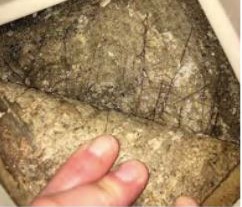
Military offers inspections, promises better service in reaction to substandard housing
In response to rats, mold and lead paint in housing, military services are conducting checks and inspections for families.
Best listening experience is on Chrome, Firefox or Safari. Subscribe to Federal Drive’s daily audio interviews on Apple Podcasts or PodcastOne.
Less than 10 days after a dramatic congressional hearing detailing rats, mold and lead paint in privatized on-base military housing, all of the military services are implementing some kind of stopgap policy to ensure service members and their families have a way to bring up housing issues to leadership without fear of retaliation.
The policies come as military families living in privatized on-base housing are reporting respiratory issues from mold, blood toxicity from lead paint and other issues like cancer that may be connected to sub-standard living conditions.
The Army directed senior commanders to immediately begin active monitoring of its military housing and barracks for health, safety and environmental concerns. Commanders have 15 days to personally conduct town hall meetings with staff from privatized management companies, so families may air their concerns.
Within the next 30 days, senior commanders must complete installation-wide housing inspections and report the results.

There are currently more than 87,000 privatized units on more than 40 Army installations. However, the inspections will also include government-owned housing as well.
Army Secretary Mark Esper, Chief of Staff Gen. Mark Milley and Sgt. Maj. Dan Daily met with CEOs and senior executives from Balfour Beatty Communities, CRC Companies, Corvias Military Living, Hunt Military Communities, Lincoln Military Housing, Landlease Corp. and Michael’s Military Housing last week to discuss solutions.
Poor customer service emerged as a top issue.
“The CEOs agreed to work on a ‘Tenant Bill of Rights,’ suspend certain fees, and allow Soldiers to suspend their rent payments if they believe that service is not satisfactory. In addition, they made commitments to improve work-order transparency through an online tracking system, and to ensure sufficient numbers of trained staff are available at each installation to address housing problems in a timely manner,” an Army release stated.
Navy, Marine Corps taking a different approach
Instead of doing mandatory inspections of housing, each sailor residing in privatized or government housing will be contacted by their command leadership and asked if their housing is satisfactory by April 15.
“They will be afforded an opportunity for a visit from their command at their residence. The purpose of these visits is threefold: (1) to raise our Navy awareness of family living conditions, (2) to personally observe any issues affecting the home and to understand any actions being taken to address them; and (3) if a problem is found, to help your Sailor and their family get the problem resolved,” a Navy order from the chief of naval operations stated.
Sailors who agree to a visit will have a two-person team — ideally made up of the sailor’s division officer and division chief — conduct a home visit. If a sailor declines a visit, he or she will have the option to talk about any issues over the phone.
“The government role in the privatized partnership arrangement became too passive, leaving the day-to-day operation of the housing program to the residents and the private partners. We need to reengage, especially at the command level, to advocate for our sailors,” CNO Adm. John Richardson said in the memo.
The Marines are also offering voluntary home visits.
“I expect commanders to know where their Marines and sailors are living and to actively advocate on their behalf,” said Gen. Robert B. Neller. “Because we care, we have an obligation to be personally invested in the lives and welfare of our Marines and their families.”
Air Force going one step further
On Feb. 20, the Air Force announced an ambitious inspection of all of its 74,500 housing units by March 1.
Related Stories
The results will give senior civilian and military leaders a better understanding of the extent and severity of the problems with on-base housing. Investigators will use a standard checklist to ensure consistency.
The Air Force is also asking residents to document any health or safety risks. The directive requires command teams to “solicit feedback from their airmen about any health or safety issues in the housing they occupy.”
The feedback is supposed to address the issue of retaliation. During the Feb. 13 hearing, military families reported facing retaliation from commanding officers for complaining about the condition of their housing.
The directive asks the Air Force Inspector General to review how the Air Force responds to complaints about housing. On Monday, Reuters reported the Air Force is at the very early stages exploratory stages of creating a tenant bill of rights.
In addition, the service is conducting a policy review to make sure there are no directives that impede commanders from responding appropriately. The Army also asked its IG to review housing issues within the service.
Copyright © 2025 Federal News Network. All rights reserved. This website is not intended for users located within the European Economic Area.
Scott Maucione is a defense reporter for Federal News Network and reports on human capital, workforce and the Defense Department at-large.
Follow @smaucioneWFED





